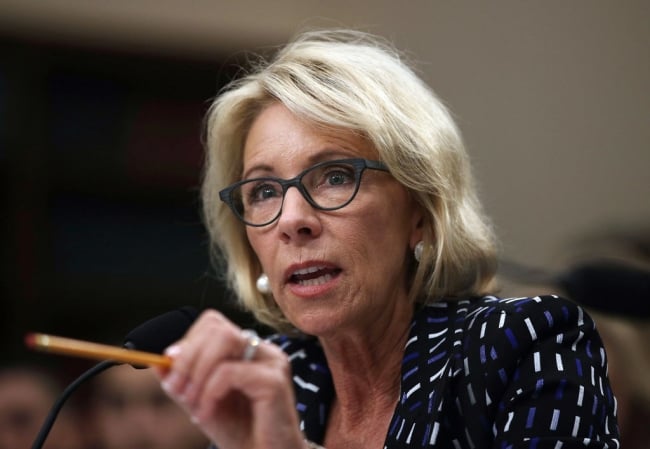You have /5 articles left.
Sign up for a free account or log in.

U.S. Education Secretary Betsy DeVos
Getty Images/Alex Wong
Three weeks ago the U.S. House of Representatives' oversight committee threatened it might subpoena U.S. Secretary of Education Betsy DeVos if she didn’t confirm she would appear before the body on March 3 to answer an array of questions.
It doesn’t sound like DeVos is going to go.
Instead of an RSVP, the acting general counsel for the Education Department sent the committee a scathing letter pushing back at what he considers to be overreach by the committee -- and saying the subpoena threat “signals an unhealthy appetite for the abuse of congressional power.”
The Feb. 7 letter from Reed Rubinstein went on to say the threat provides “strong reason to believe the demand for the secretary’s testimony has nothing to do with a good, fair and constitutional process.”
The department’s letter, first reported by Inside Higher Ed, is uncommonly aggressive and further ramps up what’s already been a tense relationship between the Democratic majority on the oversight committee and DeVos, said Clare McCann, New America’s federal policy director and a senior policy adviser at the department during the Obama administration.
“I never saw wording like this,” McCann said of her time at the department, even though it was under scrutiny from Republican lawmakers.
“My read is that things are escalating” and it seems unlikely the committee will back off, she said.
Indeed, Representative Carolyn Maloney of New York responded to a tweet about the letter noting the DeVos administration apparently doesn't appreciate being subpoenaed: "Then she should show up and do her job, instead of campaigning for #IMPOTUS," she said.
And a senior Democratic oversight committee aide, in response to Rubinstein's letter, left open the possibility of issuing the subpoena.
"The oversight committee is investigating Secretary DeVos’s failure to protect students, borrowers and survivors of sexual assault, but she has repeatedly stonewalled and refused to provide documents and witnesses," the aide said in a statement. "We have tried to work with her in good faith to find a mutually agreeable date, but we will not take any option off the table to ensure that she testifies before the Committee."
Relations between the committee and the department had already been tense, with Maloney, the committee’s Democratic chairwoman, accusing DeVos of stonewalling attempts to get her to come answer questions about a range of issues, including how it was handling the dismissal of student debt for those defrauded by colleges and universities, the breaking off of negotiations with a union representing department workers, its oversight of student loans, and a final rule DeVos could issue as soon as this week to change how institutions handle allegations of sexual assault and harassment on campus.
Maloney noted the secretary found time to campaign for President Trump.
“Ignoring -- or defying -- requests for congressional oversight in order to spend your time campaigning for President Trump is an abuse of your position as Secretary of Education,” Maloney wrote DeVos on Feb. 3, giving her until Feb. 7 to commit to testifying before the panel at next week’s hearing, or “the committee will need to consider compulsory process to obtain your testimony.”
But on the day of the deadline, Rubinstein wrote back calling the allegation of an abuse of power for DeVos appearing on behalf of Trump in Iowa and Pennsylvania earlier this month a “breathtakingly wrong statement” and counterfactual.
Instead, the department said it has responded to requests from the oversight committee and others that it considers “reasonable and lawful.” The department cooperated in those cases by “turning over massive numbers of records, providing in-camera reviews of privileged documents, conducting expert issue briefings for staff and principals, and when appropriate making department officials, including the secretary, available for live committee testimony.”
He also said the department is working to answer the committee’s questions about private collection agencies and processing borrower-defense claims and offered to set up a meeting with financial aid officials to answer questions. Rubinstein also said DeVos or senior officials have testified before Congress 12 times since January 2019, and that the secretary is scheduled to appear before the House appropriations committee on Thursday.
However, on other matters, like the department’s coming new rule requiring those accused of sexual assault or harassment on campuses to have a right to cross-examine their accusers and its suspension of a contract negotiation with a union representing agency workers, he wrote, “You demand testimony on matters for which the committee has previously conducted no oversight.”
Rubinstein said the committee has “stonewalled and refused to answer” the department's repeated questions about “the bases for and lawful purpose of your demands.”
He continued, “We will not -- and as a matter of constitutional principle must not -- accede to broad and paralyzing demands for information with only the remotest connection to any proper purpose or participate in hearings that are not calculated to facilitate lawful congressional activity.”
“The committee’s course of dealing, its refusal to provide clarity and narrow issues, and its baseless threatened subpoena all provide strong reason to believe the demand for the secretary’s testimony has nothing to do with a good, fair and constitutional process,” he wrote. Rubinstein also said the committee's actions, “including the threatened subpoena to compel testimony on unspecified or previously unaddressed matters, suggest a distressing disregard for the dynamic process of accommodation required by law. It also signals an unhealthy appetite for the abuse of congressional power.”




